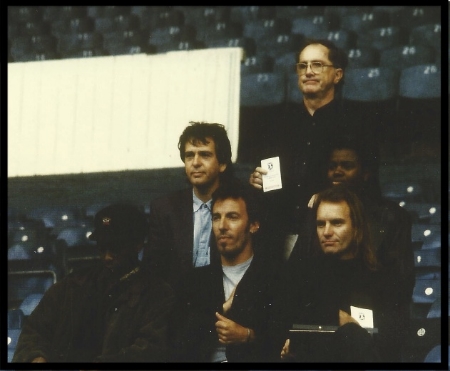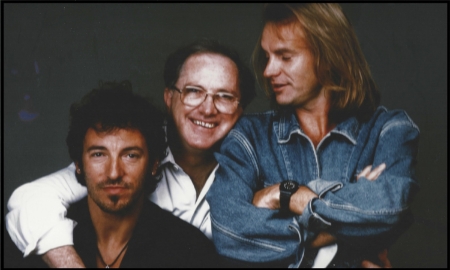In 1988, the 40th anniversary of the Declaration of Human Rights, Human Rights Action Center Director, Jack Healey (formerly Executive Director of Amnesty International USA) created and organized the Human Rights Now! tour to celebrate achievements of the human rights movement and to introduce the idea of basic human rights protection through the power of the media to millions of people worldwide. Hundreds of thousands of people filled stadiums and crowded into fields for concerts from South America to Eastern Europe and from Africa to Asia. This tour was also responsible for tripling Amnesty International's membership worldwide and helped the organization become perceived as truly global.
Musicians Bruce Springsteen, Sting, Peter Gabriel, Tracy Chapman, and Youssou N'Dour, joined together in order to spread the human rights word across 35,000 miles. Human rights activists themselves, they invited audiences around the world to become human rights activists too. The universality of the Declaration was expressed by touring the world, playing 18 countries in just six weeks. The Human Rights Now! tour was not a caravan for charity. It was a campaign for freedom.
Here is what these musicians had to say about human rights:
Bruce Springsteen
"Earlier today Amnesty international announced a worldwide tour to celebrate the 40th anniversary of the Declaration of Human Rights.
The Declaration of Human Rights is a document that was signed by every government in the world 40 years ago recognizing the existance of certain inalienable human rights for everyone regardless of your race, your color, your sex, your religion, your political opinion, or the type of governement that you're living under."
Peter Gabriel
"The world in which we live is full or injustice, oppression, deprivations, and atrocities against people. In every country there are men, women, and children who have no voice and whose basic rights are ignored or abused.
Forty years ago the General Assembly of the United Nations adopted the Universal Declaration of Human Rights. Although it has been used as a framework of ideals, it does not have the force of law. This document needs to be given real life and strength. With your help this tour can achieve that.
Respect for others is the basis for the establishment of human rights. Progress is always difficult, slow and erratic but it is always possible. In the last century slavery was acceptable in our society. In the last century children were sent down mines seven days a week. There are still countries where people do not get the vote. We must build the list of what we not tolerate in our world.
Read this declaration and let the words burn in your heart until they are written into the legal system of every country in the world- every country that agreed to support it forty years ago."
Sting
"I don't belong to a church or political party or a group or any kind. I feel that Amnesty International is the most civilized organization in history. Its currency is the written word. Its weapon is the letter; that's why I am a member. I believe in its non-violence; I believe in its effectiveness. its dignity and its sense of commitment. Its focus on individuals and the concentration and tenacity with which they defend those imprisoned for their ideas has earned it the cautious respect of repressive governments throughout the world."
Tracy Chapman
"People all over the world are imprisoned for their political beliefs. I think mostly, people are unaware of that. They don't think it exists and this is where, maybe this tour is gonna help because they don't understand really how much simply writing letters and calling people does. Y'know it really puts pressure on government officials to do what they can to let these people out.
They are not necessarily individuals who have been politically known, they're just people out there fighting for what they believe in or voicing their opinion and they end up in jail."
Youssou N'Dour
"Those who say what they think and who have had the courage to not yield to pressure. Another reason I support Amnesty International is that I have found, throughout my worldwide travels, that there are many people who don't realise how important this organization is in the struggle for human rights. Amnesty International is virtually the back bone of this struggle.
In Dakar in 1970, when I was younger, I remember a man named Oumar Blondin Diop, who was imprisoned for his political beliefs. He died in prison, which created a very tense situation in Dakar. Since I lived near the cemetery where he was buried, I experienced the fifteen-day police take-over solely aimed at preventing youths from gathering at Diop's tomb. That chain of events left a deep impression on my views of human rights violations.


